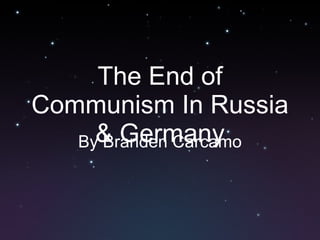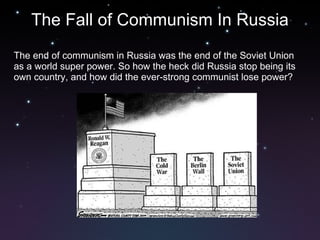BC
- 1. The End of Communism In Russia & Germany By Branden Carcamo
- 2. The Fall of Communism In Russia The end of communism in Russia was the end of the Soviet Union as a world super power. So how the heck did Russia stop being its own country, and how did the ever-strong communist lose power?
- 3. Russia stopped being its own country in 1922, when the formation of the Soviet Union created a country which scooped up Russia along with many other small countries, states, and territories of Russia. When the Bolsheviks and the Red Army fought against the White Army (some of the world's imperial powers) in the civil wars following the Russian Revolution of 1917, they won, setting up communism rule. Many Russians thought this way of life would continue forever, but with the end of communism, Russia has been changed. Communism was the way of life for the USSR From 1922-1991, during which the government, culture, religion, economics and everything else in the country was covered by the communist ideals. Leaders such as Joseph Stalin and Nikita Khrushchev provided stong leaders for the communist government, coming up with plans to industrialize the rural country, and take away a lot of Russian freedoms. Religion was forbidden, capitalism was gone, and the average citizen had no say in the way their country was run. BLAH!
- 4. In the 80's, Mikhail Gorbachev came into power as the head of the USSR. His policies involved much more reform than his predecessors, with ideas of openness and "new beginnings" being his theme. He removed the heavy restrictions and previous crack-downs on free speech that other communist leaders had created, allowing the citizens to criticize the government without Russians fearing that they'd be pushing dasies. Gorbachev also tried to de-centralize the economy, which did not sit well with the conservative cats. The military tried taking him out of power, and even though it didn't work, it caused the collapse of the Soviet Union. Gorbachev lost power and was replaced by Russia's first elected head of state, President Boris Yeltsin. The USSR dissolved, creating fifteen separate independent republics, one of them being the country of Russia. The election of Boris Yeltsin marked the true end of communism, Russia was now seen as democratic. Since this time, the country has been struggling with the creation of a democratic government and capitalist economy Gorbachev Yeltsin
- 5. So, What's Up? While some Russians feel that they are much better off now without the influence of communism, others are disappointed with the poverty and government issues they are facing. The Russian economy is slowly becoming strong enough to support all who need to make a living there, and the government still is questioned over items such as human rights. they might be in a fix right now, but I feel Russia will come out of it okay.
- 6. The Fall of Communism In Germany Mikhail Gorbachev’s reforms had an big impact on Eastern Europe. Freed from the threat of Soviet interference, countries like Poland shook off Communist rule and held elections. But one Soviet ally didn't change. That knucklehead was Erich Honecker, the leader of East Germany. A meanie conservative guy, this dude Honecker opposed reform and tried to cut off his country from the West. For example, in 1961 he had built the Berlin Wall. (After World War II, Berlin became a divided city; part belonged to East Germany and part belonged to West Germany. The Berlin Wall was built to prevent East Germans from escaping.)
- 7. Honecker’s government restricted most travel. East Germans could travel to other Communist nations, but that was it. Until the 1980s, they couldn't visit West Germany. When East Germans did begin to visit the West, only one member of a family could go at a time. Because their relatives were virtual hostages, almost all travelers returned. As in the Soviet Union, the economy in East Germany was in trouble. East German industries had old-school equipment that could not produce up-to-date consumer stuff, such as the "new" personal computers. To obtain these goodies, East Germany had to trade with the West. But that also created problems. Because East Germany’s products were basically crap compared to the high-tech gear of the West, East Germany could not export as much as it imported. As a result, the country ran up a big-o' foreign debt. The debt grew because of East Germans’ demands for imported stuff. The people East Germany suddenly woke up and smelled the coffee. Although the government censored the media at home, it couldn’t block TV transmissions from the West. By watching TV, East Germans saw that their peoples across the border were far more prosperous than they were. In addition, East Germans learned about democratic reforms in the rest of Eastern Europe and wanted changes like that in East Germany.
- 8. Fall of the Berlin Wall (That rhymes!) In 1989, one of those democratic reforms damaged the East German government. Hungary opened its border with Austria. Suddenly, East Germans on vacation in Hungary could travel through Austria to reach its neighbor- West Germany. Thousands of people took this new escape route. The loss of workers crippled the East German economy. The government had to close its borders even to neighboring Communist nations, because they were losing a lot of their population. This caused a lot of pissed off East Germans. They protested and rioted, because of the restriction.The people wanted free travel, and free elections. Erich Honecker had to resign, but they replaced him with Egon Krenz. But homeboy Egon couldn't even stop the madness. Finally at the end of 1989, Egon Krenz announced it would open up the border and break dwon the wall.
- 9. Within 24 hours, hundreds of thousands of Germans rushed to break in the Berlin Wall. The stampede was so large that the border guards gave up trying to control it. Germans climbed on top of the wall- the hated symbol of separation.. People began to demolish the wall, kick the wall, punch the wall, some even urinated on the wall. To enable the huge crowds to cross the border faster, the government sent bulldozers to break big holes in the wall.
- 10. As these dramatic events were taking place, Krenz announced that he was working toward holding free and democratic elections. The West German guy who was in power, Helmut Kohl, responded to the hype by announcing a plan to reunite West and East Germany. In 1990, the idea of a united Germany put up red flags for other nations. Many Europeans, remembered Germany in the two world wars, and feared that it might again try to dominate Europe. In response, Kohl assured the world that Germans were going to be “good little Europeans” and would not threaten their neighbors. The two German nations were officially reunited on October 3, 1990, and Helmut Kohl became chancellor. Germany will see brighter days in the future.









